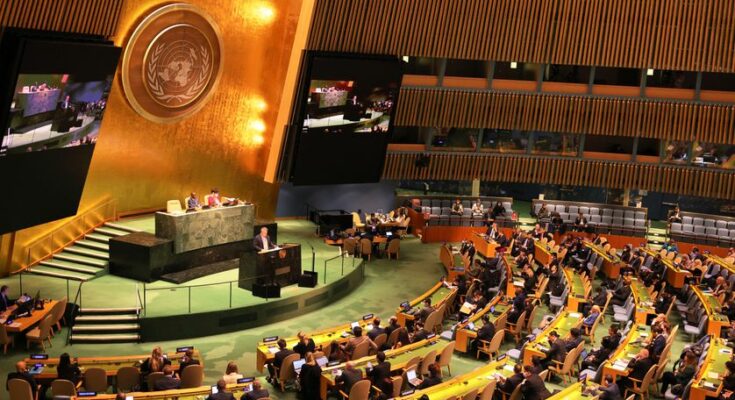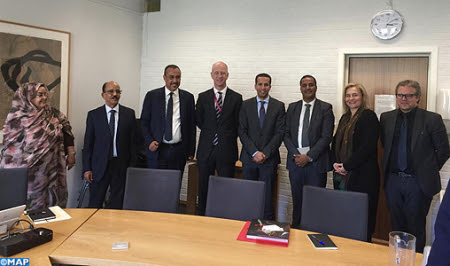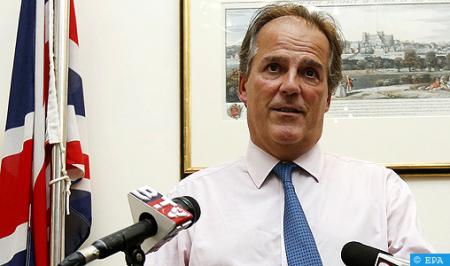Several petitioners and Delegates of UN members States have voiced unwavering support to the autonomy plan offered by Morocco for the Sahara under its sovereignty, praising the socioeconomic development achieved in the Moroccan Sahara which enjoying peace, stability and inclusive growth.
Addressing the 2023 session of the United Nations C-24 convening in New York, the representative of Côte d’Ivoire said Morocco’s autonomy initiative offers many opportunities to local populations and is the best compromise solution to the Sahara issue.
Voicing concern about the situation in the Tindouf camps, he called for the recommendations of the Office of the High Commissioner for Human Rights (OHCHR) to be upheld.
The Delegate of Dominican Republic voiced support for the UN-led process aimed at reaching a mutually acceptable solution to the Sahara regional dispute in line with Security Council resolutions, describing the Moroccan autonomy Plan as a basis for reaching a realistic solution.
The representative of Antigua and Barbuda called on Algeria, Morocco, Mauritania and Polisario to continue to actively participate in good faith in the round-table processes, noting that this is the only peaceful way to ensure a successful outcome.
Voicing support for Morocco’s autonomy initiative, he said it offers a compromise solution to the regional dispute and is in line with international law, the UN Charter and Security Council and General Assembly resolutions.
The delegate of Saint Lucia said the Moroccan autonomy initiative is serious and credible, urging all parties to the Sahara conflict to support the efforts of the UN Sahara envoy to advance dialogue towards a realistic and mutually acceptable solution.
The ambassador of Papua New Guinea reaffirmed his country’s backing to the Moroccan autonomy initiative, offering a solid basis to build on and progress towards a lasting solution, drawing on the United Nations Charter and relevant resolutions, noting the encouraging support of over 100 countries to the Moroccan proposal.
The permanent representative of Saint Kitts & Nevis to the UN expressed support for the political process under way and voiced confidence in the efforts of the Secretary-General’s Personal Envoy saying these efforts will lead to a realistic and practical solution, based on compromise as called for by Council resolutions.
Welcoming the autonomy plan put forward by Morocco, the diplomat said it is a realistic initiative and will facilitate the resolution of this prolonged dispute.
The ambassador of Guatemala voiced support for the autonomy initiative proposed by Morocco in 2007 as a realistic and serious basis for reaching a negotiated solution to the Sahara regional dispute.
Achieving a solution is necessary for the stability, security and integration of the Maghreb region, said the diplomat, expressing support for the efforts of the Secretary-General and his Personal Envoy in assisting parties to reach a mutually acceptable solution to the conflict.
The same supportive stand was voiced by the representative of Dominican Republic, who commended the Moroccan autonomy plan and the efforts made by the UN chief and his personal envoy in order to find a just and peaceful solution to the Sahara issue.
Speaking on behalf of the Gulf Cooperation Council at the UN, the Representative of Oman stressed the importance of the strategic partnership between the GCC and Morocco, saying the Gulf countries support Morocco’s efforts to solve the Sahara issue. The Omani diplomat hailed the “serious and realistic” autonomy plan offered by Morocco for a lasting settlement of the Sahara question that will bolster security and stability in the region.
The delegate of Burkina Faso said the United Nations must continue to play a key role in the resolution of the question of Sahara, expressing support for the political process initiated by the Secretary-General.
Morocco’s autonomy initiative is a realistic and trustworthy alternative, said the diplomat, adding that it is in conformity with international law and Security Council resolutions.
The representative of Senegal welcomed the social, economic, and democratic progress achieved by Morocco in its Saharan provinces, commanding the pragmatic autonomy initiative proposed by the North African Kingdom for an enduring and peaceful resolution of the Sahara issue.
The Delegate of Gabon said the Moroccan autonomy initiative provides an acceptable and negotiated political solution and benefits from international support.
Noting the positive developments on the ground, the diplomat said that Moroccan Sahara now participates in the Special Committee’s regional seminars. More than 30 countries, including Gabon, have opened consulates in Saharan Moroccan cities of Laayoune and Dakhla, said the Gabonese diplomat, voicing concern over the deteriorating humanitarian situation in the polisario-controlled Tindouf camps.
The Permanent representative of Equatorial Guinea called for the resumption of the Sahara round-table format with the same four participants, praising Morocco’s commitment to regional cooperation and constructive dialogue.
Morocco has shown genuine will to seek a peaceful solution, he said, commending the work of the UN Sahara envoy for re-launching the UN political process to resolve this regional conflict.
The Delegate of Comoro Islands expressed support to Morocco’s territorial integrity and sovereignty over its Sahara, describing the Kingdom’s efforts as serious and credible for the settlement of this regional conflict.
Morocco is making constructive efforts for the socioeconomic development of the Sahara and continues to promote the well-being of the local population, said the Comoro representative.
The same supportive stands were expressed by several countries including Burundi, Liberia, Togo, Guinea-Bissau, Gambia, Sierra Leone, Cabo Verde, Guinea, Djibouti, Jordan, Kuwait, Qatar, Saudi Arabia, UAE…
Morocco’s permanent representative to the UN said the issue of the decolonization of the Moroccan Sahara was “definitively and irrevocably sealed” under Chapter VI of the United Nations Charter.
Therefore: “Only the Security Council is in a position to make recommendations, which it does every year,” he stressed, affirming that the question of referendum had been “effectively buried” by the Council two decades ago.
He voiced regret that Algeria does not wish to take part in the round-table talks, despite successive calls by the Council for all parties to come to the table, thereby blocking the UN-led political process.
Ghalla Bahiya, Vice-Pdt of Dakhla-Oued Ed-Dahab regional council, commended the remarkable progress made in the Moroccan Sahara. When recovered in 1975, it was the least developed region in her country, she said, adding that today the southern provinces have very high development indicators.
Drawing attention to the regional and local elections in 2021, she said they demonstrate Morocco’s commitment to democracy. The new development model launched by Mohammed VI in 2015 is an ambitious initiative that is boosting the economy and developing infrastructure, renewable energy, and tourism.
For his part, M’hamed Abba, Vice-Pdt. of Laâyoune-Sakia Al Hamra regional council, highlighted Morocco’s great efforts in creating new opportunities for the development of its southern provinces.
The new development model for that region launched in 2015 has mobilized all resources to stimulate the socioeconomic development process and priority sectors with the aim of ensuring the well-being of Moroccan Sahara’s citizens. Voicing concern about the situation in the Tindouf camps, he said Morocco’s autonomy initiative has the support of a growing number of countries and is the basis for negotiations to find a solution to that dispute.
Dahi Ahl El Khattat, speaking for the Rotary Club of Dakhla, said the Sahara population elects its local and national representatives, and that those elections enjoy high levels of participation.
He deplored the lamentable conditions suffered by the inhabitants held in the Tindouf camps by Polisario armed militiamen who have committed the worst possible crimes, in collusion with the host country, Algeria.
Moulay Brahim Chrif, “Laâyoune Initiatives” Association, praised the autonomy initiative, which provides for legislative and administrative institutions to run the affairs of the Sahara locally and democratically.
The inhabitants of the region elect their representatives, he said, citing the new development initiative launched by Morocco in 2015, while in Tindouf camps, the inhabitants have been suffering for five decades.



